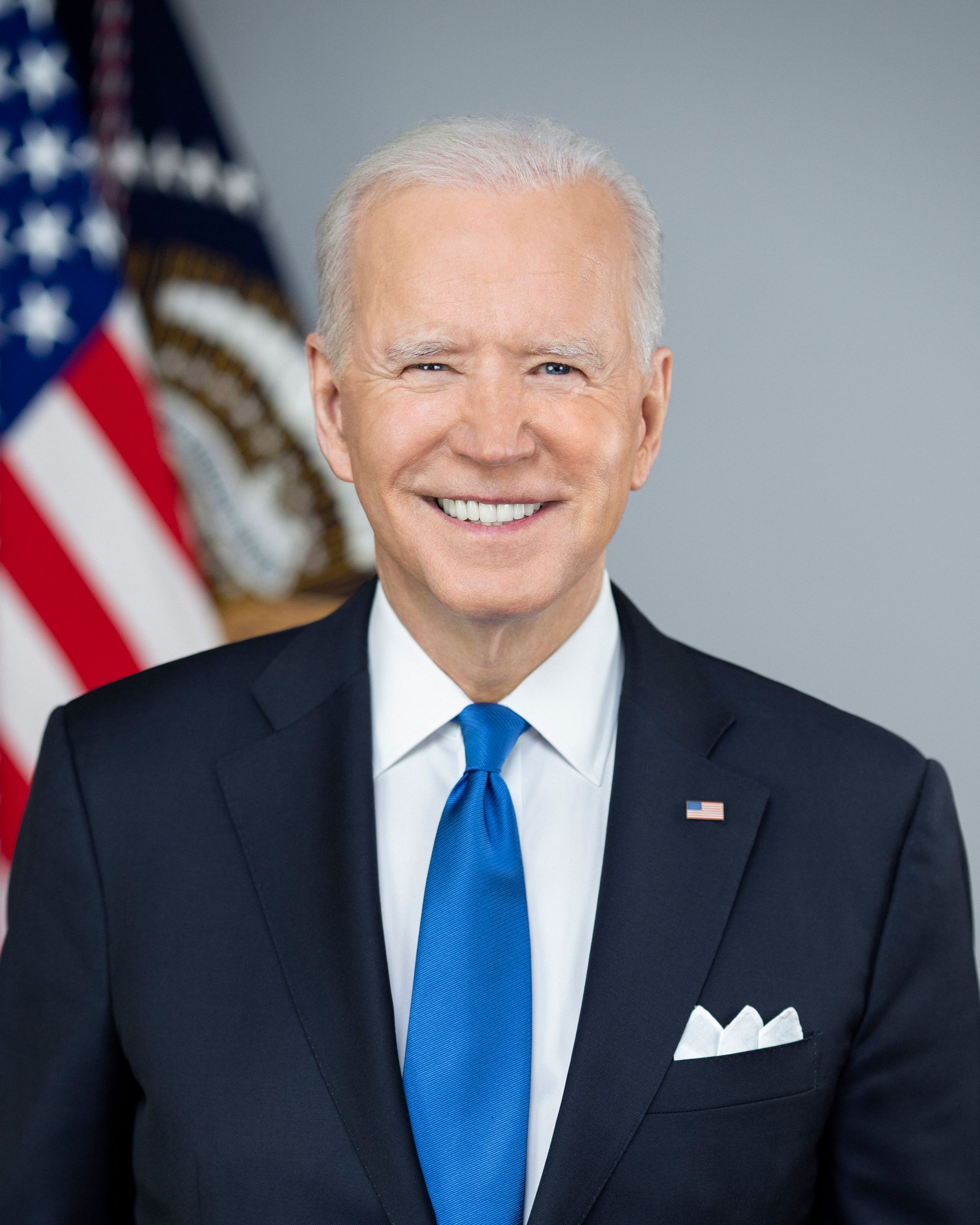This piece is published with the generous permission of John Della Volpe. To read more of his outstanding writing and analysis, visit JDVonGenZ+.
By John Della Volpe
Last Monday, President Biden visited with young voters in Madison, Wisconsin, sharing details of a new plan to ease student loan debt for millions of Americans — of all ages. To date, the President has relieved more than $140 billion in debt, giving economic boosts and lifelines to roughly 4 million Americans — many of whom are public servants.
Here’s a rundown of the headlines from the most extensive and in-depth study I have ever done on this subject. This analysis reflects 10 hours of focus groups and a national survey of more than 3,800 registered voters.
There were definitely some surprising — and if you’re an advocate for debt forgiveness — very encouraging results.

Contrary to what many in the political sphere might believe, there’s a broad base of political support among the electorate for government action on student debt relief. This subject is often volunteered in the initial phases of focus groups when I ask what government can do to stabilize the lives of a generation that has been hit harder than most by inflation, mortgage rates, and increasing costs of groceries and gas.
For young college graduates, they tell me that student loan debt:
“Is like a giant anchor pulling you into the depths of the sea.”
And for many, who ran up thousands and debt but never did graduate, I routinely hear comments like the one below:
“I owe more than what I initially borrowed. It feels very overwhelming.”
For personal reasons like this:
“I'm really angry about the brainwashing that minors go through that they must go to college. Literally every adult in my life at church, at school, at home told me that. There was no other path mentioned. And then I go to college, and it's the worst financial investment of my life.”
Also, for macro-level reasoning, which I share below in #3, a supermajority of voters support government action to relieve millions of Americans of their student debt. Our recent survey of nearly 4,000 registered voters across 50 states found:
Only 22% believe the government should not change policy or cancel any more debt.
Majorities of virtually every subgroup believe some government action should take place (i.e., cancel all debt, cancel only for most in need, help with repayment options) — which includes those who have already paid off their loans (67%), those without debt (66%), Republicans (56%), and older baby boomer and Silent gen voters (63%).
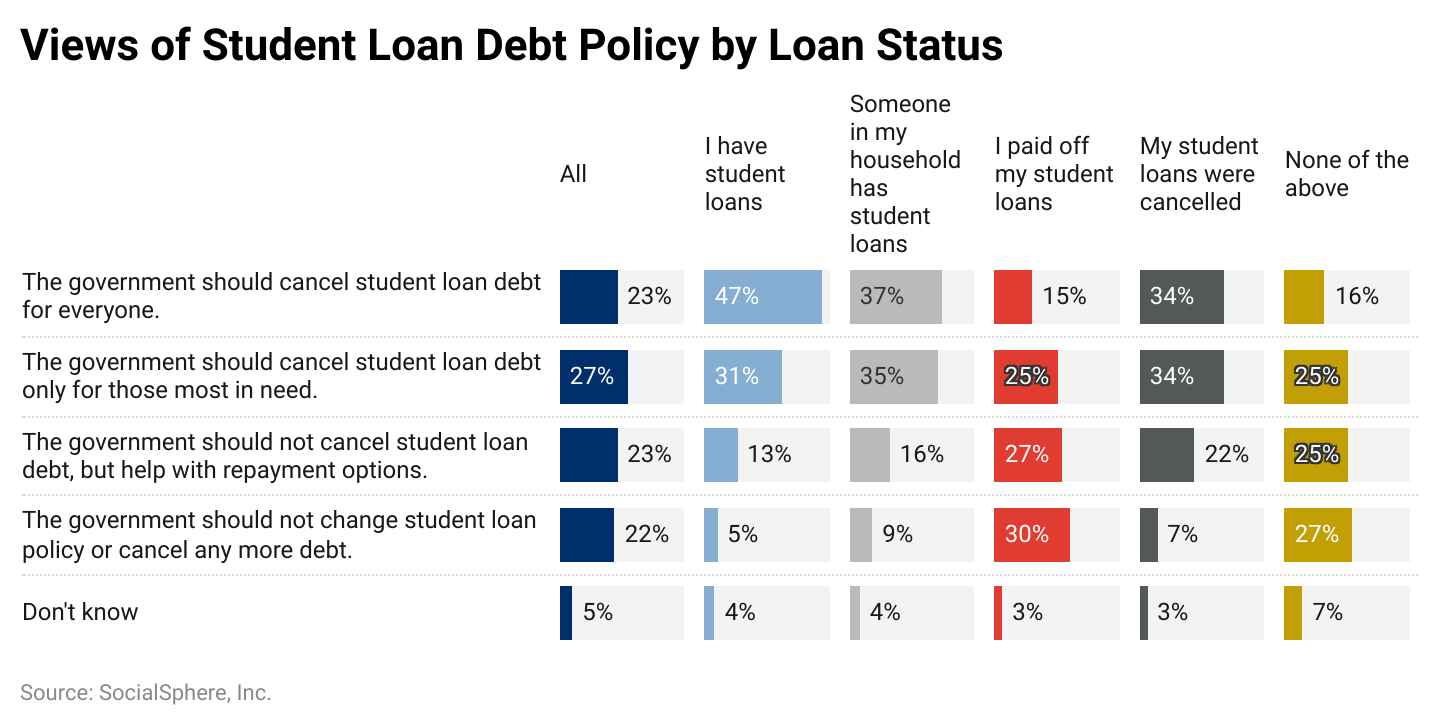
While pundits often misread the public polling and suggest that only one or two issues are of significance to voters (and this cycle, those are usually either inflation or the border), countless other issues matter because they’re either connected to the broader concerns of voters, or are signals to the values, vision, and priorities of the candidates.
Student loan debt is one such issue. For millions of first-time voters in 2020, addressing student debt — along with the climate, school shootings, and gun violence — was what Gen Z and younger millennials sought in the first Biden-Harris term. And while the political terrain in 2024 has evolved and encompasses other issues such as Israel-Gaza, student loan debt still holds sway with the subgroups of the electorate who could well be the difference — young, Black, and Hispanic voters.
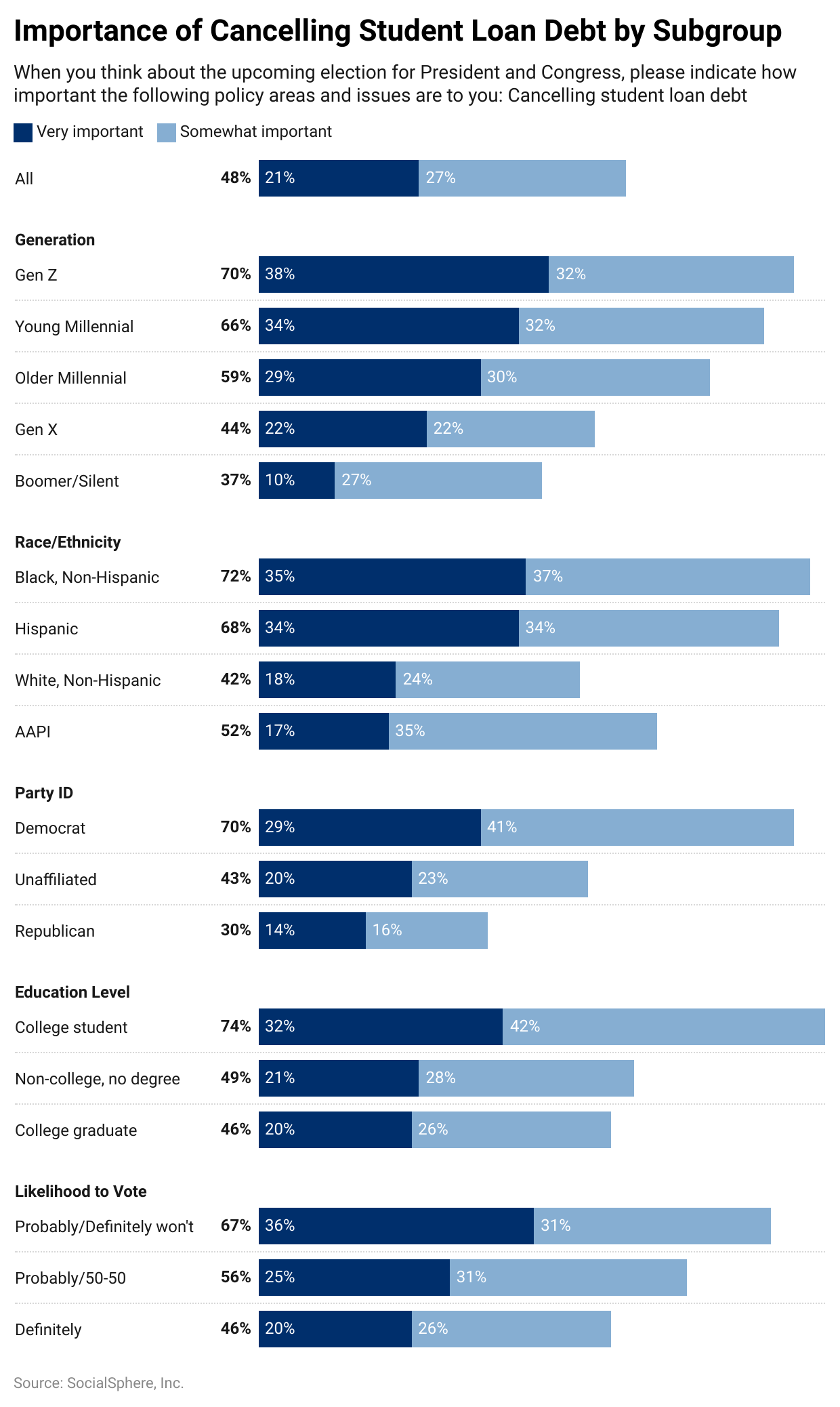
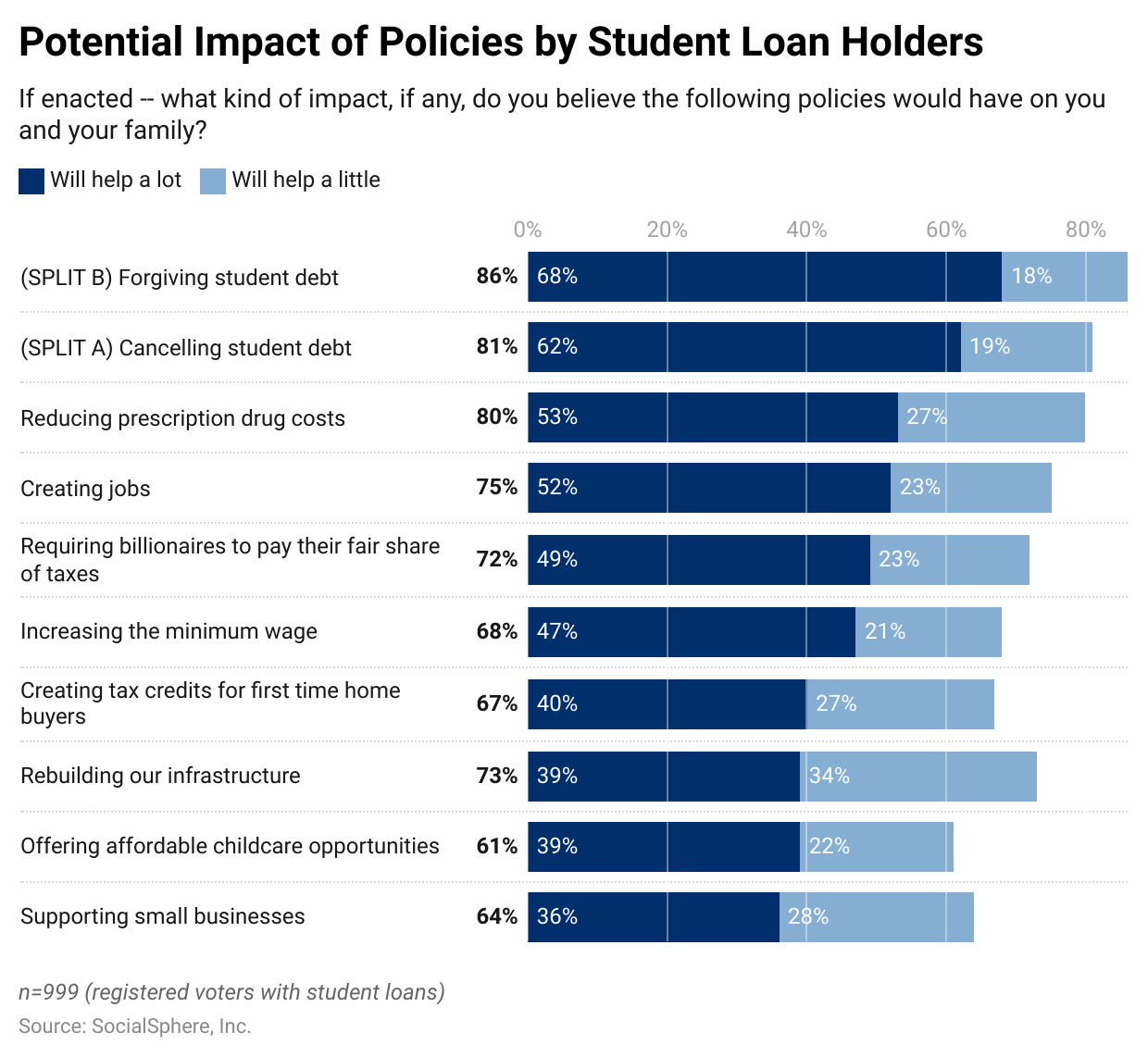
Debate over student debt has been raging among young voters for more than a decade. However, one of the more surprising series of findings for me personally was the degree by which so many other groups of voters see student debt as not only an issue of fairness, but as a driver to a stronger American economy.
A majority (53%) of all voters believe that forgiving student debt will help strengthen the American economy either a lot or a little — which is twice as much as those who think such a policy would hurt the economy. The only political or generational group where more of its members believe this policy will do more harm than good is older Republican voters (30% help, 46% hurt). As the chart below indicates, a majority of younger and older Democrats, younger Republicans, and younger independent voters all believe forgiving student debt boosts the economy.
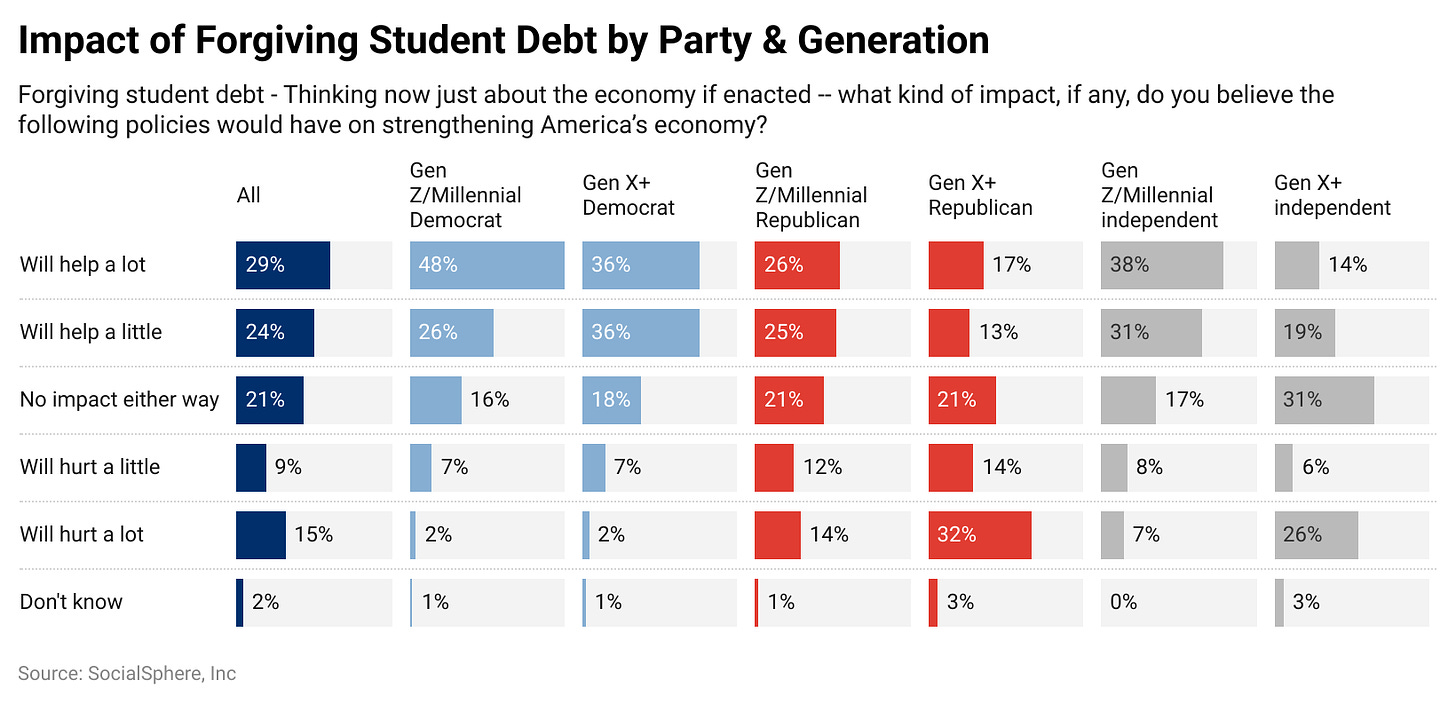
This shows most Americans agree with the sentiments of what young voters shared with me in recent focus groups:“I don't see somebody renting, paying student loans, and still saving up the money to put down on a home. If that loan forgiveness was there, more people would be able to go out and purchase homes or newer cars.” (Male, No Degree)
“People would be a little bit more stabilized in their lives. I think that [cancelling student loan debt] could potentially keep people off of welfare...So it could have a nice little ripple effect if their debt was erased.” (Female, College Graduate)
In just a few years, the issue of student debt relief has evolved from a political talking point to a pivotal policy priority, thanks to the relentless advocacy of a diverse coalition of Americans spanning generations.
As President Biden prepares to unveil his plan in Wisconsin, it marks a significant moment where good politics intersect with good policy. Millions of young voters placed their trust in President Biden based on his commitment to this issue, and today's announcement underscores his dedication to fulfilling that promise despite many roadblocks from Republicans and challenges from the Supreme Court. This enduring action not only strengthens support for his administration but also restores faith in the purpose of politics and government.
Whether from red, blue, or battleground states, voters across the spectrum share a fundamental belief that education should not equate to a lifetime of debt. Today's announcement and the milestone of $150 billion in relief are testaments to the power of political engagement and the impact of multi-generational advocacy.
Without the dedication of Gen Z and millennials, millions more would be burdened with uncertainty, stress, and financial strain. Today is a helpful reminder to young Americans, at a very critical time, that politics matters. Stay engaged.


